Customer Company Size
Large Corporate
Region
- America
Country
- United States
- Canada
Product
- EXTOL Business Integrator
- Woodstream wildlife and pest control systems
- Woodstream lawn and garden products
- Woodstream pet supplies
Tech Stack
- EDI
- SQL Server
- iSeries Server
Implementation Scale
- Enterprise-wide Deployment
Impact Metrics
- Productivity Improvements
- Cost Savings
- Customer Satisfaction
Technology Category
- Application Infrastructure & Middleware - Data Exchange & Integration
- Analytics & Modeling - Real Time Analytics
- Functional Applications - Inventory Management Systems
Applicable Industries
- Consumer Goods
- Retail
Applicable Functions
- Logistics & Transportation
- Sales & Marketing
Use Cases
- Supply Chain Visibility
- Inventory Management
Services
- System Integration
- Data Science Services
About The Customer
Woodstream is a provider of wildlife and pest control systems, lawn and garden products, and pet supplies. Their brands include Victor Pest, Havahart, SaferBrand, Fi-Shock, and Perky-Pet, with product lines including traps, repellents, baits, bird feeders, and landscaping and houseplant solutions. They sell to customers of all sizes - from big box retailers and home improvement giants such as Wal Mart, K-Mart, Lowe’s, and Home Depot, to hardware chains such as Ace, True Value, and Do-It-Best, to downtown, mom and pop, and specialty stores. They have more than 1,000 customers, representing over 100,000 retail outlets.
The Challenge
Woodstream, a provider of wildlife and pest control systems, lawn and garden products, and pet supplies, was informed by their legacy EDI system provider that their product would no longer be supported. This meant that Woodstream would have to go through a complete conversion and platform change to use the vendor’s supported solution. As the team was establishing requirements for a new system, they uncovered needs beyond traditional EDI. They needed an automated way to accept and integrate formats such as spreadsheets, flat files, and XML. They also pinpointed a need for A2A integration to automate and synchronize sharing of data between disparate applications and platforms for better reporting and improved internal business processes.
The Solution
Woodstream decided to go with the EXTOL Business Integrator (EBI) because it offered much more functionality beyond EDI and it could be managed by their existing team. EBI has created a way to expedite the extensive amount of work required by IT during the company acquisitions. They’ve enhanced reporting throughout the enterprise with their ability to synchronize data and processes and expose data from disparate systems. They are increasing the availability of their web ordering system and automating the integration between website orders and their back-end applications and processes. They are also using EXTOL to manage both traditional EDI and the much more complex automation of integrating non-EDI formats such as spreadsheets, XML, and flat files.
Operational Impact
Quantitative Benefit

Case Study missing?
Start adding your own!
Register with your work email and create a new case study profile for your business.
Related Case Studies.
.png)
Case Study
Improving Vending Machine Profitability with the Internet of Things (IoT)
The vending industry is undergoing a sea change, taking advantage of new technologies to go beyond just delivering snacks to creating a new retail location. Intelligent vending machines can be found in many public locations as well as company facilities, selling different types of goods and services, including even computer accessories, gold bars, tickets, and office supplies. With increasing sophistication, they may also provide time- and location-based data pertaining to sales, inventory, and customer preferences. But at the end of the day, vending machine operators know greater profitability is driven by higher sales and lower operating costs.

Case Study
Improving Production Line Efficiency with Ethernet Micro RTU Controller
Moxa was asked to provide a connectivity solution for one of the world's leading cosmetics companies. This multinational corporation, with retail presence in 130 countries, 23 global braches, and over 66,000 employees, sought to improve the efficiency of their production process by migrating from manual monitoring to an automatic productivity monitoring system. The production line was being monitored by ABB Real-TPI, a factory information system that offers data collection and analysis to improve plant efficiency. Due to software limitations, the customer needed an OPC server and a corresponding I/O solution to collect data from additional sensor devices for the Real-TPI system. The goal is to enable the factory information system to more thoroughly collect data from every corner of the production line. This will improve its ability to measure Overall Equipment Effectiveness (OEE) and translate into increased production efficiencies. System Requirements • Instant status updates while still consuming minimal bandwidth to relieve strain on limited factory networks • Interoperable with ABB Real-TPI • Small form factor appropriate for deployment where space is scarce • Remote software management and configuration to simplify operations

Case Study
Digital Retail Security Solutions
Sennco wanted to help its retail customers increase sales and profits by developing an innovative alarm system as opposed to conventional connected alarms that are permanently tethered to display products. These traditional security systems were cumbersome and intrusive to the customer shopping experience. Additionally, they provided no useful data or analytics.

Case Study
How Sirqul’s IoT Platform is Crafting Carrefour’s New In-Store Experiences
Carrefour Taiwan’s goal is to be completely digital by end of 2018. Out-dated manual methods for analysis and assumptions limited Carrefour’s ability to change the customer experience and were void of real-time decision-making capabilities. Rather than relying solely on sales data, assumptions, and disparate systems, Carrefour Taiwan’s CEO led an initiative to find a connected IoT solution that could give the team the ability to make real-time changes and more informed decisions. Prior to implementing, Carrefour struggled to address their conversion rates and did not have the proper insights into the customer decision-making process nor how to make an immediate impact without losing customer confidence.









